The day began as we tried to get some breakfast and watched for the march to move off from the Plaza of 14th September. There were huge puppets, with a striking similarity to those seen in photos from the demonstrations in Seattle, a range of banners and a largely female crowd, with sun hats on. It was deceptive at first, appearing to be only a few hundred people, but as we moved out of the narrow central streets and along the main thoroughfare, it became apparent that there were many thousands of people marching. Banners included, ‘Water is a Right’, ‘The water is ours, dammit!’, and ‘Ten Years of Struggle’.
We marched quietly, apart from the occasional firecracker, along the main streets and over the heavily polluted river that runs through the city, toward the location of the conference being held as part of the commemoration. People were arranged in neighbourhoods or districts, and many walked in organised lines. An overwhelming majority were women, many with children and babies. It was a great atmosphere, determined and powerful.
We talked to Nellie, a woman from the Zona Sur, and asked her why she was marching. She explained that in the Zona Sur, or Southern Zone of the city, there is still no drinking water and it is expensive for families to buy it in. For them the struggle for water is ongoing, La Lucha Sigue! Zona Sur is made up of six districts and is home to around 250 000 people, some of the poorest in the city and those most affected by the ineffectiveness of SEMAPA (Municipal Service of Drinking Water and Sewage).
SEMAPA is the publicly owned company that was set up when Bechtel, the foreign multinational brought in during privatisation, was thrown out in 2000. One of the aims of the conference is to evaluate the failures and successes of SEMAPA, although that discussion was apparently cancelled last night, we don’t know why. The majority of people in Zona Sur still do not have access to water unless they buy it in containers at a high price, and this is one of the main criticisms we heard along the march. While 5-7 Bolivianos, (or 50-70 pence) per 200 litre container may not seem like much, Bolivia remains the poorest country in South America. The countrywide minimum wage is 175 Bolivianos a week, but this only applies to those with a contracted job. Many of those who live in Zona Sur will be eeking out a living as vendors on the streets or in the informal market, and therefore will only earn what they sell in a day.
It also became apparent that many of the people living in this area are not originally from Cochabamba, but have migrated from Oruro and Potosi. One of the reasons cited was the pollution from the water through the massive mining operations in these areas.
When the march arrived at the Complejo Fabril, (an old industrial estate that had been transformed into a football stadium) we dived for the shade under the trees. An elderly Quechuan woman, Justina, soon came over to where we were sat and began to inquisitively ask us questions, who are we, where are we from, what do we grow there and do we have running water? She was soon smiling and telling us not to leave Bolivia, or if we did to take her with us in our rucksacks.
The story of suffering caused by lack of water that she told us was very similar to Nelly’s. She said she was there because the authorities didn’t remember their areas, “We came here last year too, to demand water, but still there is no water and no sewage systems.” I asked her why so few men were participating in the march and she said that many were working, “If they don’t then how we will we drink?”
At the end of the march there was a platform, facilitated by Oscar Olivera, who was one of the main protagonists of the Water Wars. Water struggles from around the world were represented by the main speakers, giving an overview of the links between water privatisation and how this is a major issue being resisted globally. One theme that came out repeatedly was that the problems faced now will only be exacerbated by climate change. Speakers included Francessca Caprini from the Italian Forum, talking about how the water in Italy has recently been privatised, and Mary Ann Manahan from Focus on the Global South, Asia
Events will continue over the next few days, and communities will share experiences of self-organised technologies and ways forward.
http://ayya2cochabamba.wordpress.com/
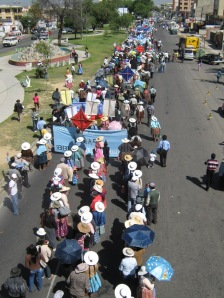

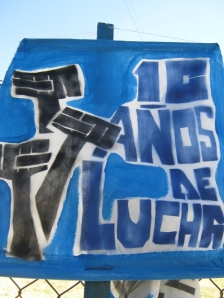
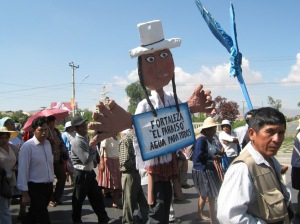

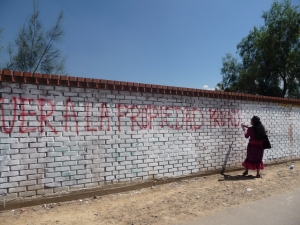

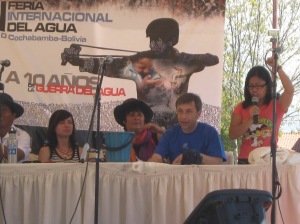



No comments:
Post a Comment